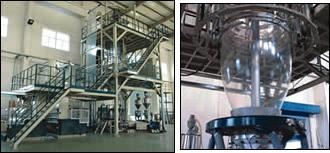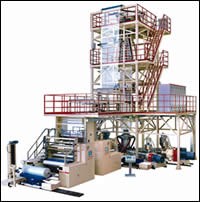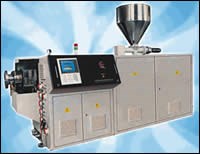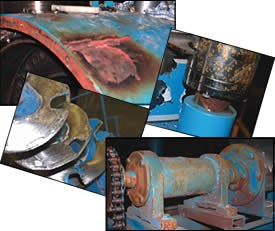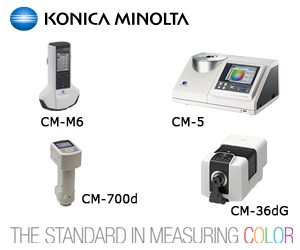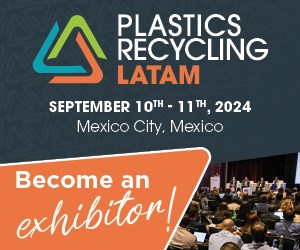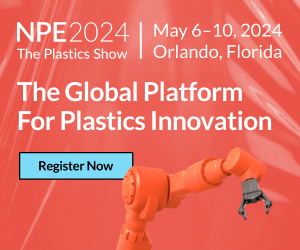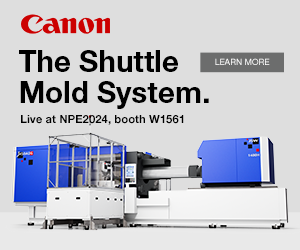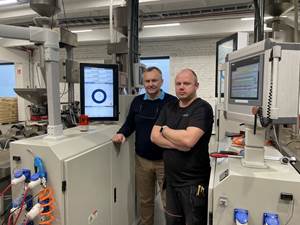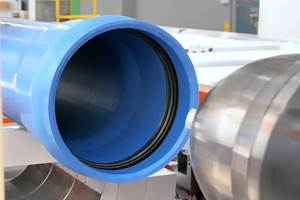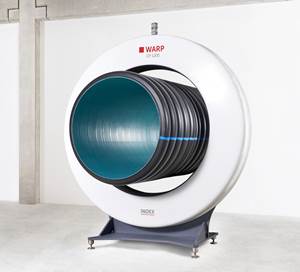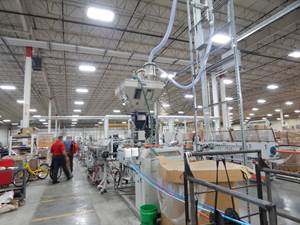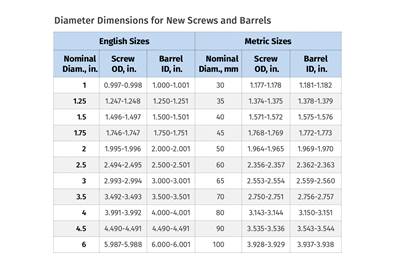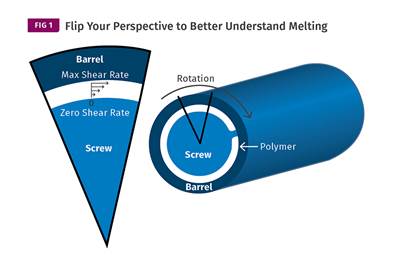Extruders Made in China: They're Coming Here Now
Low-priced Chinese-built extruders have arrived in North America to make pipe, sheet, film, and profiles. Some customers find them a good buy; others don’t. Here’s what you need to know.
Chinese-built extruders are arriving here in small sizes and modest numbers. Most are bought one at a time by large, sophisticated processors who are sampling the Chinese market and can afford to throw a machine away if they don’t like it. Some are being bought by small start-up companies tempted by prices only one-third to half those of North American or European extruders. Some of these North American buyers felt they got a good deal and ordered more machines. Others have gotten burned.
Most of the Chinese extruders in the U.S. and Canada are making PVC pipe and profiles, but some are used on specialty extrusion lines for composite and corrugated pipe, wood/plastic profiles, and blown or cast film. The most frequent general problem encountered with Chinese extruders is electrical compatibility issues, ranging from relatively benign—e.g., replacing a Chinese controller with a U.S.-made one—to catastrophic. Wires, for example, might be the right color but too thin to meet our electrical codes. In the worst cases, processors had to call in electrical contractors to rewire entire machines to bring them up to code. The added cost, from $50,000 to $60,000 per line, in some cases nearly doubled the ultimate cost of the extruder.
The Chinese machine builders listed in this article all actively market extruders here and exhibit at international shows like Chinaplas in Guangzhou last May, NPE in Chicago last year, and the K Show in Germany last month. Most of these Chinese OEMs are offshoots of large former state-owned enterprises and come from a tradition of mass producing generic machines with little ability to customize.
“These machines are ideal for the Third World, where a processor may want to run HDPE, LLDPE, and nylon all on one machine and labor is cheap and they don’t care about output rate,” says extrusion consultant Paul Waller, president of the Touchpoint Group, who has been called in to fix Chinese extruders. For reasons like those he cited, most Chinese extruders are exported to relatively unpicky and unregulated markets in the Middle East, Africa, and South America.
Lately, more entrepreneurial Chinese machine builders are trying to gain access to more advanced technology and are forging partnerships with U.S., Canadian, and European OEMs to meet standards for export to those markets. As a result, many export-model Chinese extruders offer German or Japanese computer controls and European gears, drives, and thickness gauges.
Yet it is still a case of “Buyer Beware.” Though a large number of extruders at this year’s Chinaplas exhibition sported what looked like Siemens controls, some were empty boxes “just for show,” says Siemens’ sales manager Holger Schurmann. However, he notes that many Chinese builders of extruders, including one of the largest, Shanghai Shen Wei Da Machinery Co., do use real Siemens controls on their machines.
Even then, buyers need to look closely. Some U.S. processors say they specified Siemens controls on extruders and received simple, inexpensive Siemens controls built specially for Chinese injection molding machines, though the controls can sometimes be used for extrusion. Siemens discontinued those Chinese controls last September. The moral is that buyers should specify a particular model of Siemens controller and then be sure that what arrives isn’t just a box with a Siemens’ name.
Don’t be fooled by a nice paint job. One disgruntled buyer of a Chinese extruder recalls, “From the outside it was beautiful. It looked just like a KraussMaffei, but it couldn’t hold temperatures and the output suffered. It worked, but I wouldn’t buy another one.”
Film & sheet successes
Other buyers tell happier tales. When Dennis Wong traveled to China to find a blown film machine for his converting business, Polynova, in Richmond, B.C., what got his attention about Jin Ming machines was a very clean oscillating nip and haul-off. That was not surprising, since Guangdong Jin Ming Plastics Equipment Co. had built haul-offs for several years for a large German blown film OEM.
Wong’s company, Polynova, imported the first Jin Ming blown film line in North America five years ago. He liked the three-layer line so much that he set up PEC-Plastic Equipment Co. (formerly JM Canada) to represent Jin Ming. This year, Polynova replaced the original line with a newer one and sold the older system to a start-up company in Vancouver.
The first Jin Ming machine in the U.S. was shown at NPE 2006 and was sold to Polythin Films in Aberdeen, N.C., div. of Plastic Packaging Co. in Hickory, N.C. Polythin visited Polynova to examine its Jin Ming line before deciding to buy. Not everything worked right initially, notes Jin Ming’s U.S. sales agent, James Collins of Southern Converting Systems. One problematic component was a corona treater built by a different Chinese company. Collins simply bought a U.S.-made replacement. According to Polythin plant manager Roy Snipes, spare parts for the line have been readily available from China, and PEC is working on stocking more parts here.
Jin Ming is the only Chinese blown film system that uses Swiss-made Kundig thickness gauges for automatic gauge control. Jin Ming has five blown film lines in Canada and seven in the U.S. It exhibited a line for blown stretch film at the K 2007 show last month; that line was sold to a U.S. company.
Another Chinese builder of blown film extruders, Sun Centre Machinery Co. (represented here by Karlville), says it has 11 blown film lines in the U.S., including eight in California and two in New Jersey. Sun Centre also supplies winders, oscillating nips, and bubble cages to processors here. Its standard controls come from Fatek in Taiwan; Japanese or German controls are optional. Sun Centre exhibited at NPE last year and showed a three-layer line with an oscillating nip at the K Show last month; it was sold to a processor in Israel.
Wu Han Changxin Plastic Machinery Co. in Wu Han Province says it has one monolayer film line installed in Vancouver, B.C. Chanxin advertises that its machines comply with CE, BQC, JAF, and CNAB standards and that its facilities are ISO 9001-2000 certified.
Two Taiwanese machine builders have supplied small, simple blown film lines and single-lane bagmakers in North America for as long as 17 years. Queen’s Machinery in Taipei claims to have over 50 blown film lines here, including some at Advanced Polybag in Houston.
Lung Meng Machinery Co. (represented in the U.S. and Canada), claims to have a number of blown film lines in North America. Sealed Air has several, including one in Lenoir, N.C. R&P Plastics in Wichenden, Mass., has four and a fifth on order. At the K Show last month, Lung Meng showed a new stretch-film line.
Han King Plastic Machinery Co. in Taiwan also claims to have blown film extruders in the U.S. and Canada. It exhibited a large tower at Chinaplas for five-layer barrier film with up to 1.6-meter layflat. The line was touted as “super high speed.” It had grooved feed throats, barrier screws, and 50-hp AC motors. Han King uses a thickness gauge from Octagon Process Technology in Germany, as well as Octagon’s dual-lip auto-gauging air ring.
Vale Packaging Ltd. in Hubbards, N.S., bought the first sheet line in North America from Zhejiang Honghua Machinery Plastic & Rubber Co. in China, along with four thermoformers. Later on, Vale became a rep for the Chinese equipment. Vale president Edward Baker helped Honghua rewrite technical manuals into readable English and meet Canadian codes (though it isn’t listed yet by CSA).
Vale’s second Hongua sheet line, a three-layer coex system, will be installed this month to make two-colored PET sheet for thermoforming. Honghua exhibited at NPE last year and at the K Show last month.
Extruders for PVC
Twenty-year-old Shen Wei Da says it has over 50 twin-screw extruders in the U.S. One customer, Silverline Building Products (now part of Andersen Corp.), initially bought one to try out, then added 10 more in its Durham, N.C., window and door profile plant, despite some issues with overheating, a company source says. Silverline also bought from Shen Wei Da a 90-mm parallel twin-screw that was shown at NPE 2006.
Shen Wei Da originally built parallel counter-rotating twin-screws from 75 to 130 mm diam. Three years ago it introduced parallel corotating twins from 22 to 127 mm. Its latest development is dual-strand downstream equipment for large profiles.
Nanjing Rubber & Plastics Machinery Plant Co. (also called Global Rubber and Plastics Machinery Co.) says it sold nine extrusion lines last year to one company in Canada, all with model HT 67 corotating twin-screw extruders with Siemens control cabinets and Omron controls. Nanjing Rubber & Plastics, which also makes single screws, exhibited at NPE last year.
Zhejiang Jinhai Plastic Machinery Co., also called Jinhu, showed a PVC foam board line at Chinaplas earlier this year. Jinhu claims to have delivered 20 extruders in the U.S., mostly for small PVC pipe. It makes both single- and counter-rotating twin-screws.
Beijing Great Wall-Peony Mould Manufacture Co. is a five-year-old company started by two Chinese electronics makers. (It is represented here by Skyreach Group in Toronto). Great Wall builds calibrators and is an agent for extruders built by Jiancheng Machinery Co. in Beijing (also represented by Skyreach). Skyreach claims to have sold over 20 Jiancheng PVC extruders from 20 to 75 mm diam. here since 2004, all to firms in the Toronto area, for making pipe, window profiles, and foamed PVC. It supplies single-screw and conical and parallel counter-rotating twins.
At least two Chinese machine builders recently introduced so-called “Buss kneaders” for PVC compounding. (Real Buss Kneaders are made by Buss AG in Switzerland, with U.S. offices in Carol Stream, Ill.) Jiangyin Xinda Plastics Machinery Co. recently sold a lab size “Buss kneader” with Siemens controls to an engineering compounder in Minnesota.
Nanjing Ruiya Polymer Processing Equipment Co. in Nanjing City also recently developed what it calls a “Buss kneader.” In addition, Ruiya claims to have delivered three of its Model TSEW 95 corotating twin-screw extruders in North America, all with an extremely long 68:1 L/D.
Corrugators for pipe
Shanghai Jwell Machinery Co. has one PVC pipe extruder in the U.S. at North American Pipe Co. (part of Westlake Chemical Co.) in Houston. A source there says that after some electrical reworking to solve connectivity problems, it is running in the Wichita Falls, Texas, plant.
Jwell builds conical and parallel counter-rotating twin-screws and single-screw extruders for PVC, including wood/plastic composites (WPC) and foamed profiles. It also builds dies, single- and double-wall corrugators, and downstream cooling and takeoff equipment for up to 800-mm-diam. corrugated or smooth HDPE pipe. It advertises TUV- and CE-compliant machines for the European Union with Siemens controls and claims to have ISO 9001-2000 facilities. Jwell exhibited at the K Show last month.
Guangdong Liansu Machinery Manufacturing Co. claims to have delivered one extruder in Canada for large spiral-wound pipe. Liansu builds corrugators for up to 1.2-meter-diam. pipe and has designed one for up to 1.6 m. Mold sections rotate on tracks, not chains. Liansu exhibited at NPE last year and at the K Show last month.
Foreign alliances
Chinese machine builders have entered joint ventures with established European machine builders to make their machines more acceptable in export markets. Ningbo Fangli Group Co. has had a joint venture with Graewe GmbH Maschinenbau in Germany since 2003, to integrate Fangli’s pipe extruders with Graewe’s high-speed pipe-coiling technology. Graewe-Fangli extruders and coilers use Chinese-built Siemens controls with software written by Fangli. Fangli says it has exported three extruders with striping coextruders to the U.S. this year to make HDPE pipe up to 450 mm OD. Fangli exhibited at NPE last year.
In cast film, Nantong Sanxin Plastics Equipment Technology Co. entered a joint venture last year with Dolci Srl in Milan, Italy, which allows it to offer a choice of Simplas dies from Italy and NDC thickness gauges or the local Chinese equivalent.
Some Chinese machine builders have adopted German-sounding names, but have no German connection. Zhangjiagang City Beier Machinery Co. builds conical twin-screw extruders for PVC and corotating twin-screw extruders for recycling. The company chose the name Beier because the Chinese owner liked the sound of it. Beier claims to have delivered one conical twin-screw in Canada last year.
And Foshan Techwell Plastic Machinery Co. in Foshan City says it has a partnership with CPM Milacron. CPM was a German builder of parallel twin-screw extruders, acquired a few years ago by Milacron Inc., but no longer an active business entity. Techwell claims to have sold one counter-rotating parallel twin-screw machine in the U.S. to make large PVC pipe.
Litigation and liability
A few Chinese equipment purchases have resulted in lost production or low-quality products, litigation, and even plant closures and bankruptcy. One extrusion consultant recalls being called to the same blown film plant on three different occasions in the 1990s to fix the same four small Taiwanese blown film lines, because they weren’t making good-quality film.
“I told them the machines weren’t repairable,” the consultant says. “The air cooling wasn’t well regulated, so one half of the barrel was hotter than the other half. That had warped the barrel into a banana shape, so the screw, which was straight, hit metal. That equipment was bought out of bankruptcy sales three times,” he recalls. “Each time, the next owner couldn’t make it work either.”
The most highly publicized debacle involving Chinese-built extruders is an extrusion line for WPC decking sold by Futuresoft Technologies in Millburn, N.J., to Newlab Plastics Ltd., a start-up in St. John’s, Newfoundland. The extruder was built by Jwell and other components by other Chinese suppliers. The line cost $505,000 initially plus another $200,000 to completely rewire it after it arrived, Newlab says. The purchase contract specified new, state-of-the-art equipment, but according to Newlab owner Dean Payne, what was delivered in early 2005 was an assortment of used equipment. Newlab says the equipment could not run at the rates specified in the contract (2000 metric tons/yr) and is now in storage. Newlab is dormant while it awaits judgment on a $6.5-million lawsuit against Futuresoft for breach of contract and damages.
Futuresoft says it spent April to September 2005 working on the line at Newlab and that it now can make quality products. It reportedly was not used equipment but had rusted in storage and shipping. Futuresoft is countersuing Newlab for $200,000 for the unpaid balance of the purchase price and says that most of the expense for wiring was for site preparation in the plant, not for the machines themselves. Futuresoft says it has two WPC extrusion lines like the ones at Newlab that are running at a customer in Canada. It also delivered two in the U.S. this year that aren’t operating yet, Futuresoft says.
Since 2006, Futuresoft’s WPC equipment has been built by Shaan Xi Qinchuan Machinery Development Co. through a joint venture called QC Future. Quinchuan, which is publicly traded in China, primarily builds gear grinding and CNC machines. It has a plastics machinery factory that builds blow molding equipment but its website doesn’t list extruders among its products. The website does say that in 2002 it developed wood-plastic pre- and post-forming equipment, “which demonstrates our excellent R&D ability with plastics machinery.” QC Future is organizing a conference on WPC technology in China next month. It also exhibited at NPE last year and at the K Show last month.
Another cautionary tale is that of Casement Window & Door Co. in North York, Ont. Casement is owned by a group of investors including Douglas Dunsmuir, former CEO of Royal Group, and Michael Lai, owner of Onyx Group in Toronto, an importer of Chinese extruders. Casement bought six extruders from Onyx, which were delivered this past March but are still not operational. A second Onyx WPC line at the Forestry Dept. of the Univ. of Toronto was installed over a year ago and also is not operational.
Onyx says the problem in both cases is inadequate site preparation for the machines, such as inadequate cooling-water supply at Casement and insufficient space for hoppers and material handling at the university R&D lab. “It’s still very early stages,” a manager at Casement says. “We have a lot to learn and a long way to go.”
Related Content
Online X-Ray Inspection Boosts Extrusion Quality
Höhle uses Sikora’s x-ray measuring systems for inline quality control of extruded microducts.
Read MoreBelling Machine Forms 'Rieber' Socket in PVC-O Pipe
Italy’s SICA has developed an innovative Rieber belling process specific for PVC-O pipes. At the same operating pressure, these pipes require a wall thickness of about 35-40% less than those in conventional PVC pipe and allow the construction of water supply pipes up to 25 bar of operating pressure.
Read MoreRadar-Based Wall-Thickness Sensor
Measurement units include an array of these sensors positioned around the circumference of the pipe, which can be placed in multiple locations on an extrusion line.
Read MoreWisconsin Firms Unite in Battle Against Covid
Teel Plastics opened new plant in record time, partnering with AEC & Aqua Poly Equipment Co. to expand production of swab sticks to fight pandemic.
Read MoreRead Next
Lead the Conversation, Change the Conversation
Coverage of single-use plastics can be both misleading and demoralizing. Here are 10 tips for changing the perception of the plastics industry at your company and in your community.
Read MoreTroubleshooting Screw and Barrel Wear in Extrusion
Extruder screws and barrels will wear over time. If you are seeing a reduction in specific rate and higher discharge temperatures, wear is the likely culprit.
Read MoreUnderstanding Melting in Single-Screw Extruders
You can better visualize the melting process by “flipping” the observation point so that the barrel appears to be turning clockwise around a stationary screw.
Read More



